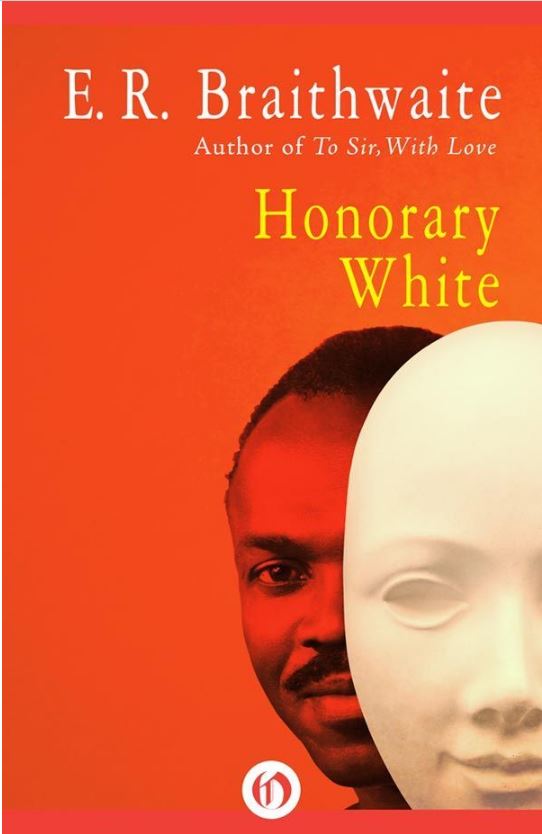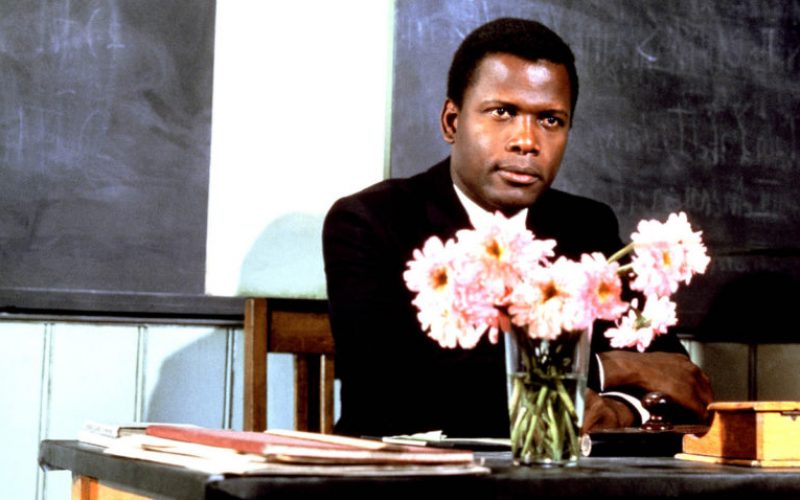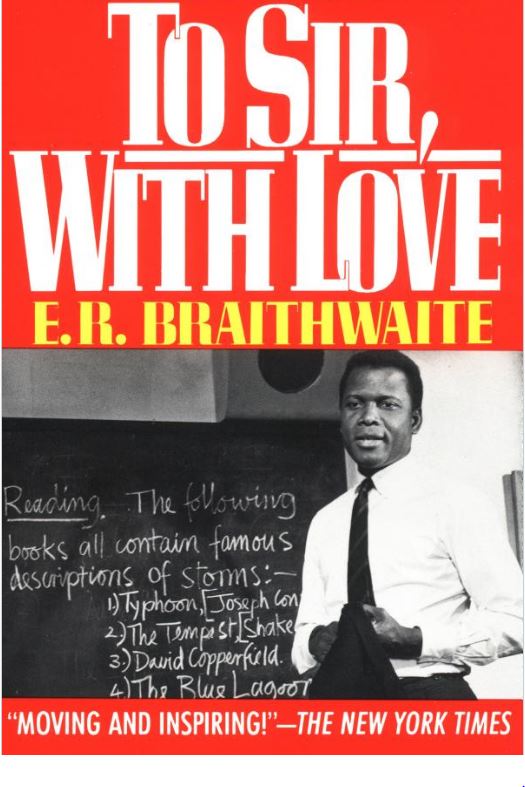An exceptional Later Bloomer turned 104 this week.
No blog, website, or newspaper celebrated his eventful life or his world-famous book and its movie adaptation. Perhaps it’s because the book debuted in 1959 and the movie came out in 1967.
Yet he kept on writing—memoirs, novels, academic texts, eleven in all. He simultaneously held down impressive day jobs—teacher, diplomat, professor, social worker.
In Spring 2006, a Connecticut college named him distinguished visiting professor. Two years later, he wrote his first children’s book. He was in his 90s.
In 2012, his hometown newspaper interviewed him. “Is there another book in you?” the journalist asked. “Yes, of course,” he replied. He’d just turned 100.
His name is Edward Ricardo (E.R.) Braithwaite. You may not recognize it, but you know who he is.
Sidney Poitier portrayed him in To Sir, With Love.
E.R. Braithwaite was born June 27, 1912, in the South American colony of British Guiana (now Guyana).
As a black man growing up under British rule, he endured prejudice, but it didn’t keep him from getting an education. It also didn’t prepare him for what he’d confront later, in England.
It was not painful for me to reflect on British Guiana’s civil service, schools, colleges, police, communications, utilities, and courts—all managed and operated by Blacks under white supervision which was more ritual than functional.
Both his parents attended Oxford and encouraged his academic aspirations. He loved the “excitement of learning, each new little achievement a personal adventure and a source of satisfaction to my interested parents.”
He attended Queen’s College, Guyana (a secondary school on the English public school model) and, in 1940, earned a BSc in Physics from The City College of New York.
Inevitably, Braithwaite was drawn to England.
Myself, my parents and my parents’ parents, none of us knew or could know any other way of living, of thinking, of being; we knew no other cultural pattern…As a boy I was taught to appreciate English literature…it was natural for me to identify myself with British heroes…
He started Master’s degree studies in Physics at Cambridge and suddenly saw the English in a new light. “White porters the college. White waiters in the dining halls…Barmen. Servants. In far off British Guiana they were served.”
Then Germany invaded Poland, and England declared war. Braithwaite and his fellow students heard a new word on the radio, “blitzkrieg.”
Then came rationing, food coupons, air-raid shelters. London evacuated masses of children to the countryside. Braithwaite joined the University Air Squadron and learned how to fly, then signed on as an aircrew cadet with the Royal Air Force (RAF).
His skin color didn’t matter. The RAF didn’t believe in segregated squadrons. All enlisted men served side by side. And Braithwaite was a favorite with the ladies.
I was at one with everything. A part of everything. Black and different as blonde was different from red. The color of my skin was no weight on my shoulders. I was proud in my skin, not defensive of it. There was a war on and I was a warrior. War drew the people together.
When World War II ended, Braithwaite completed his MSc in Physics and set off to London to find work.
He was a war veteran—a Spitfire pilot!—who graduated top five in his class at Cambridge. Nothing prepared him for the brick wall of institutionalized racism he confronted.
His credentials got him in the door. But once a potential employer saw his skin color, they made excuses. One man chatted with Braithwaite about his background, his time in the RAF, and his research at Cambridge. Braithwaite dared to hope. Then,
“Mr. Braithwaite, I’m sure my colleagues would wish me to say that we are deeply impressed with your qualifications and your obvious abilities. Were the circumstances different we would be only too happy to appoint you a member of our staff. But we have a problem. All our employees are British and we would face the reality of their almost certain reluctance to work with and perhaps under a person of color…”
He experienced that scenario over and over again for nine months. Finally, after his umpteenth rejection, his bitterness and resentment ran so deep he “hurried into the nearest public lavatory and was violently sick.”
He wandered about London, bile still rising in his throat, and found himself on a park bench.
An old man sat next to him, feeding the ducks, talking to no one in particular. He mumbled about how people could be hurt by other people and things, but mostly by themselves, and that hatred solved nothing.
Braithwaite lost it.
Look, why don’t you shut up? You white people are all the same. All this philosophical drivel has no meaning because, in fact, you are white and when you look out on the world you see it in a certain way. For black people like me it has to be different…
And suddenly his months of despair gushed forth. The old man listened as he threw breadcrumbs to the birds. Finally, he said, “Why don’t you try something else? A man like you, with your educational background, shouldn’t think that physics is the end of the world.”
He told Braithewaite that the London City Council was desperate for teachers, that they’d welcome someone with his credentials.
The next day Braithwaite phoned the Council. He got the job.
And here starts To Sir, With Love. The Council posted Braithwaite to London’s devastated East End, where school served as a place to dodge parents and the police, but not learn. Braithwaite had finally found a job. But he wasn’t happy about it.
Making plans on the half-realized dream of achievement as a physicist. Dreaming. Then the bitterness of seeing the dream whittled away, bit by bit, day by day, into weeks and months, until the only place on the whole arid horizon was a mangy schoolhouse beside a bomb-racked, rotting graveyard, and a smelly classroom with forty-six foul-mouthed youngsters. White, English youngsters.
The book, published when Braithwaite was 47, depicts a grittiness the film softened. By the time Sidney Poitier portrayed Braithwaite the ’60s were in full swing and the world had changed, but the struggles he faced remain. How Braithwaite came to love his students and vice versa make it a story for the ages.
Braithwaite admits to purely selfish motives at the time. He needed to eat, to pay the rent, to have something of his own to rebuild his self-esteem. “It made me oblivious to the concerns of others.”
But the popularity of To Sir, With Love opened doors and changed his outlook.
 The World Veterans Federation asked him to join their Paris office as a human rights officer. UNESCO hired him as an educational consultant. The newly-independent Guyana appointed him their ambassador, first to the United Nations and then to Venezuela.
The World Veterans Federation asked him to join their Paris office as a human rights officer. UNESCO hired him as an educational consultant. The newly-independent Guyana appointed him their ambassador, first to the United Nations and then to Venezuela.
During his tenure as an ambassador, the United Nations General Assembly terminated South Africa’s mandate over South West Africa, now Namibia.
The UN assumed full responsibility for the territory and created a governing council for it. Braithwaite served as the council’s president. He heard horrific tales from witnesses who’d experienced the inhumanity of apartheid.
In the early 1970s, he retired from diplomatic work to teach English Studies at New York University. In 1973, a friend in Guyana sent him a clipping from the South African Official Gazette announcing that the ban on Braithwaite’s books had been lifted.
On impulse, Braithwaite called the South African Consul General and asked if this meant he could travel to South Africa. The Consul General invited him to find out for himself by applying for a visa.
To Braithwaite’s shock, South Africa extended an invitation to visit. They stamped his visa “Honorary White” to save any embarrassment.
From the moment he arrived, Braithwaite was caught between the government, who considered his visit a public relations coup, and the blacks, who wanted to enlist him in their cause.
At one point, he met a group of black poets and writers through a white acquaintance, John. They tell him,
We wanted to meet you, to meet a black brother who can come and go as he pleases, write as he pleases, think as he pleases. But when we meet you, we realize how it is possible to live differently from the way we are. We give you some shit because we are angry at the difference between you and us…We are here in John’s house. When it’s time to go do you think we can just walk out the door?
They cannot. It’s illegal for blacks to walk the streets after dark. John must risk his life to smuggle them out.
Before Braithwaite left, the president of Witwatersrand University, one of the few institutions openly against apartheid, offered him a visiting professorship. The president promised Braithwaite an ivory tower where he could inspire the white students’ awareness and resistance. He could live safely in the president’s home as his guest.
As much as Braithwaite loved the pursuit of knowledge, he declined the invitation.
The real difference between your black countrymen and myself lies in access to opportunity. The question you’ll have to face is, how much opportunity would you wish to see granted to Blacks, the opportunity to vote, to negotiate the sale of their labor, to own land on which to build homes, to compete according to their abilities?
Cocooning himself in a white university wasn’t the answer. He chose, instead, to bear witness. He titled the visceral memoir of his South African sojourn Honorary White.
After he published To Sir, With Love at age 47, Braithwaite wrote eleven more books. He worked as a diplomat into his 60s, which means he simultaneously pursued two careers for fifteen years. In “retirement,” he became a favorite visiting professor of English Studies and Creative Writing.
Why didn’t he pursue writing full-time after To Sir, With Love? For Edward Braithwaite, writing was a gift and a means, not an end. He started out an individual looking for a job. He ended up a writer confronting apartheid.
I discovered that I could use my work as an example, use the various stages I found myself and the way I dealt with them as an example…It seems to me that I could only get work in certain situations but I got work that placed me in a position to influence the way other people lived…
In Reluctant Strangers, a white executive grudgingly takes the last seat on a train next to Braithwaite. As their conversation progresses, the stranger becomes more and more astonished by Braithwaite’s life story. “Evidently you’re an exceptional man,” he tells Braithwaite.
Funny thing is that inside myself I don’t feel exceptional. There are lots like me, strong in themselves, feeling they can do things. But perhaps they’re not as lucky as me. They’re denied the freedom, the opportunity and the right to give expression to what they feel.
Happy 104th birthday to this modest, brilliant, exceptional man. Let’s hope his 105th will be celebrated with the fanfare he deserves!
Here’s E.R Braithwaite in an excellent two-minute video. It’s four years old, so he must be over 100. A big thank you to Open Road Media for making this video and releasing new editions of his backlist.
Calling All Biographers and Documentarians
E.R. Braithwaite has written several memoirs. His life reads like a movie (as somebody already noticed). He’s 104-years-old and lives in Washington DC. Yet no one has undertaken the writing of his biography. If you’re looking for an assignment, you couldn’t find one better. Spread the word.
(All quotes are from E.R. Braithwaite’s memoirs Honorary White and Reluctant Strangers. I also used information from articles found here and here. The inspiration for this piece came from my husband Dave, who recently rewatched To Sir, With Love and was curious enough look up the author. I’m so glad he did. Thank you, baby!)
Update December 12, 2016
Very sad to report that E.R. Braithwaite passed away today.



